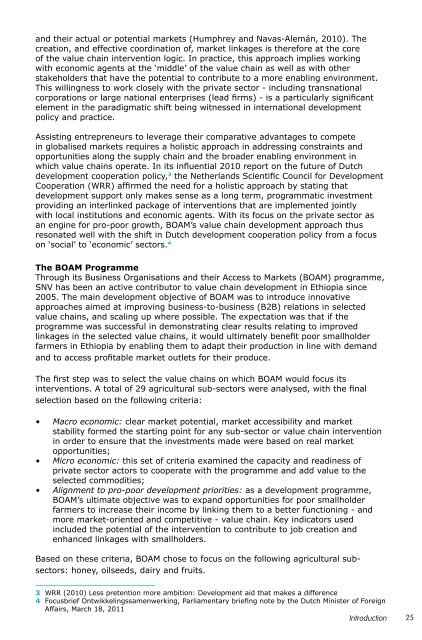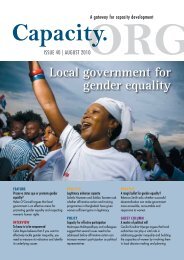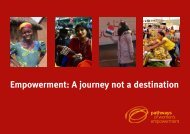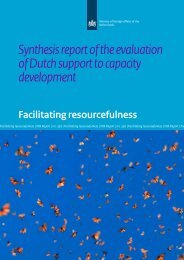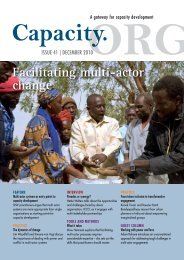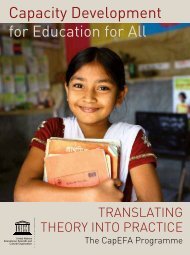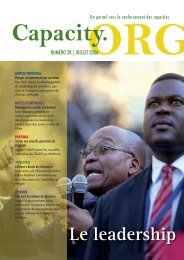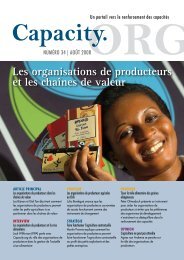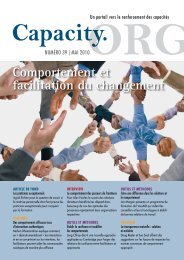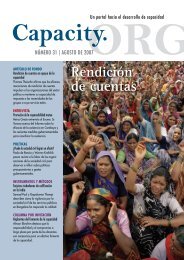Pro-Poor Value Chain Development - Capacity.org
Pro-Poor Value Chain Development - Capacity.org
Pro-Poor Value Chain Development - Capacity.org
Create successful ePaper yourself
Turn your PDF publications into a flip-book with our unique Google optimized e-Paper software.
and their actual or potential markets (Humphrey and Navas-Alemán, 2010). The<br />
creation, and effective coordination of, market linkages is therefore at the core<br />
of the value chain intervention logic. In practice, this approach implies working<br />
with economic agents at the ‘middle’ of the value chain as well as with other<br />
stakeholders that have the potential to contribute to a more enabling environment.<br />
This willingness to work closely with the private sector - including transnational<br />
corporations or large national enterprises (lead firms) - is a particularly significant<br />
element in the paradigmatic shift being witnessed in international development<br />
policy and practice.<br />
Assisting entrepreneurs to leverage their comparative advantages to compete<br />
in globalised markets requires a holistic approach in addressing constraints and<br />
opportunities along the supply chain and the broader enabling environment in<br />
which value chains operate. In its influential 2010 report on the future of Dutch<br />
development cooperation policy, 3 the Netherlands Scientific Council for <strong>Development</strong><br />
Cooperation (WRR) affirmed the need for a holistic approach by stating that<br />
development support only makes sense as a long term, programmatic investment<br />
providing an interlinked package of interventions that are implemented jointly<br />
with local institutions and economic agents. With its focus on the private sector as<br />
an engine for pro-poor growth, BOAM’s value chain development approach thus<br />
resonated well with the shift in Dutch development cooperation policy from a focus<br />
on ‘social’ to ‘economic’ sectors. 4<br />
The BOAM <strong>Pro</strong>gramme<br />
Through its Business Organisations and their Access to Markets (BOAM) programme,<br />
SNV has been an active contributor to value chain development in Ethiopia since<br />
2005. The main development objective of BOAM was to introduce innovative<br />
approaches aimed at improving business-to-business (B2B) relations in selected<br />
value chains, and scaling up where possible. The expectation was that if the<br />
programme was successful in demonstrating clear results relating to improved<br />
linkages in the selected value chains, it would ultimately benefit poor smallholder<br />
farmers in Ethiopia by enabling them to adapt their production in line with demand<br />
and to access profitable market outlets for their produce.<br />
The first step was to select the value chains on which BOAM would focus its<br />
interventions. A total of 29 agricultural sub-sectors were analysed, with the final<br />
selection based on the following criteria:<br />
• Macro economic: clear market potential, market accessibility and market<br />
stability formed the starting point for any sub-sector or value chain intervention<br />
in order to ensure that the investments made were based on real market<br />
opportunities;<br />
• Micro economic: this set of criteria examined the capacity and readiness of<br />
private sector actors to cooperate with the programme and add value to the<br />
selected commodities;<br />
• Alignment to pro-poor development priorities: as a development programme,<br />
BOAM’s ultimate objective was to expand opportunities for poor smallholder<br />
farmers to increase their income by linking them to a better functioning - and<br />
more market-oriented and competitive - value chain. Key indicators used<br />
included the potential of the intervention to contribute to job creation and<br />
enhanced linkages with smallholders.<br />
Based on these criteria, BOAM chose to focus on the following agricultural subsectors:<br />
honey, oilseeds, dairy and fruits.<br />
3 WRR (2010) Less pretention more ambition: <strong>Development</strong> aid that makes a difference<br />
4 Focusbrief Ontwikkelingssamenwerking, Parliamentary briefing note by the Dutch Minister of Foreign<br />
Affairs, March 18, 2011<br />
Introduction<br />
25


